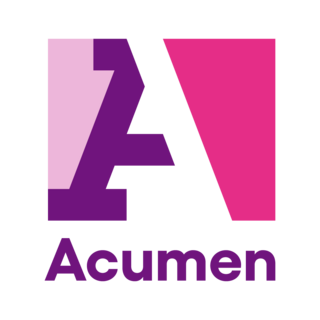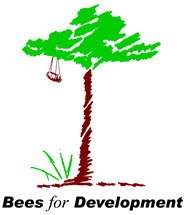
In general, a rural area or a countryside is a geographic area that is located outside towns and cities. Typical rural areas have a low population density and small settlements. Agricultural areas and areas with forestry are typically described as rural, as well as other areas lacking substantial development. Different countries have varying definitions of rural for statistical and administrative purposes.

International development or global development is a broad concept denoting the idea that societies and countries have differing levels of economic or human development on an international scale. It is the basis for international classifications such as developed country, developing country and least developed country, and for a field of practice and research that in various ways engages with international development processes. There are, however, many schools of thought and conventions regarding which are the exact features constituting the "development" of a country.

Acumen is a nonprofit impact investment fund based in the U.S. that focuses on investing in social enterprises that serve low-income individuals. Acumen was founded in April 2001 by Jacqueline Novogratz. It aims to demonstrate that small amounts of philanthropic capital, combined with business acumen, can result in thriving enterprises that serve vast numbers of the poor. Over the years, Acumen has invested $154.4 million in 167 companies and has had a successful track record in sourcing and executing investment opportunities in the clean energy, education, financial inclusion, health care and agriculture sectors.
Poverty in Pakistan has been recorded by the World Bank at 39.3% using the lower middle-income poverty rate of US$3.2 per day for the fiscal year 2020–21. In September 2021, the government stated that 22% percent of its population lives below the national poverty line set at Rs. 3030 (US$10) per month.

In developing countries and some areas of more developed countries, energy poverty is lack of access to modern energy services in the home. In 2022, 759 million people lacked access to consistent electricity and 2.6 billion people used dangerous and inefficient cooking systems. Their well-being is negatively affected by very low consumption of energy, use of dirty or polluting fuels, and excessive time spent collecting fuel to meet basic needs.

The Institute of Development Studies (IDS) is a research and learning organisation affiliated with the University of Sussex in Brighton, England, and based on its campus in Falmer, East Sussex. It delivers research and teaching in the area of development studies.

Sustainability measurement is a set of frameworks or indicators used to measure how sustainable something is. This includes processes, products, services and businesses. Sustainability is difficult to quantify. It may even be impossible to measure as there is no fixed definition. To measure sustainability, frameworks and indicators consider environmental, social and economic domains. The metrics vary by use case and are still evolving. They include indicators, benchmarks and audits. They include sustainability standards and certification systems like Fairtrade and Organic. They also involve indices and accounting. They can include assessment, appraisal and other reporting systems. The metrics are used over a wide range of spatial and temporal scales. For organizations, sustainability measures include corporate sustainability reporting and Triple Bottom Line accounting. For countries, they include estimates of the quality of sustainability governance or quality of life measures, or environmental assessments like the Environmental Sustainability Index and Environmental Performance Index. Some methods let us track sustainable development. These include the UN Human Development Index and ecological footprints.

Rural poverty refers to situations where people living in non-urban regions are in a state or condition of lacking the financial resources and essentials for living. It takes account of factors of rural society, rural economy, and political systems that give rise to the marginalization and economic disadvantage found there. Rural areas, because of their small, spread-out populations, typically have less well maintained infrastructure and a harder time accessing markets, which tend to be concentrated in population centers.

Deep Joshi is an Indian social worker and NGO activist and a recipient of the Magsaysay award in 2009. He is recognised for his leadership in bringing professionalism to the NGO movement in India. He co-founded a non-profit organisation, Professional Assistance for Development Action (PRADAN), of which he was the Executive Director till 2007. He was awarded the 2009 Magsaysay award for Community Leadership for his work for "development of rural communities". He is also a recipient of the civilian honour of Padma Shri.

Robert John Haylock Chambers OBE is a British academic and development practitioner. He spent his academic career at the Institute of Development Studies, University of Sussex. In 2013 he became an honorary fellow of the International Institute of Social Studies.
Tzedek is a UK-based registered charity organisation which aims to provide a Jewish response to the problem of extreme global poverty. Registered as a charity in 1993, Tzedek has a number of overseas development programmes, working closely with local NGOs to alleviate extreme poverty in Northern Ghana and Northeast & Southeast India. As well as supporting local NGOs within these regions, Tzedek aims to develop the leadership skills of young Jewish leaders within the community to provide a long-term, sustainable solution to global poverty.

Climate change and poverty are deeply intertwined because climate change disproportionally affects poor people in low-income communities and developing countries around the world. The impoverished have a higher chance of experiencing the ill-effects of climate change due to the increased exposure and vulnerability. Vulnerability represents the degree to which a system is susceptible to, or unable to cope with, adverse effects of climate change including climate variability and extremes.
Nigeria had one of the world's highest economic growth rates, averaging 7.4% according to the Nigeria economic report that was released in July 2019 by the World Bank. Following the oil price collapse in 2014–2016, combined with negative production shocks, the gross domestic product (GDP) growth rate dropped to 2.7% in 2015. In 2016 during its first recession in 25 years, the economy contracted by 1.6%. Nationally, 43 percent of Nigerians live below the poverty line, while another 25 percent are vulnerable. For a country with massive wealth and a huge population to support commerce, a well-developed economy, and plenty of natural resources such as oil, the level of poverty remains unacceptable. However, poverty may have been overestimated due to the lack of information on the extremely huge informal sector of the economy, estimated at around 60% more, of the current GDP figures. As of 2018, the population growth rate is higher than the economic growth rate, leading to a slow rise in poverty. According to a 2018 report by the World Bank, almost half the population is living below the international poverty line, and unemployment peaked at 23.1%.
Poverty in Sri Lanka is 31% of the population as of June 8, 2023 Sri Lanka's life expectancy and literacy rate are nearly on par with those of developed countries, and even top the rankings for the South Asia region. While all these indicate that Sri Lanka should be experiencing a high standard of living, until recently it has only ranked in the medium category of the Human Development Index (HDI). This is despite the fact that Sri Lanka has been experiencing moderate growth in its GDP averaging 5.5 per annum between 2006 and 2009. One of the reasons is due to its relatively low GDP per capital;. The Sri Lankan government has been successful in reducing poverty from 15.2% on 2006 to 8.9% in 2010, urban poverty was reduced from 6.7 to 5.3% while rural poverty was reduced from 15.7 to 9.5%, and the nation has made significant progress towards achieving Millennium Development Goals on eradicating extreme poverty and hunger.
Environmental inequality in the United Kingdom is the way in which the quality of the environment differs between different communities in the UK. These differences are felt across a number of aspects of the environment, including air pollution, access to green space and exposure to flood risk.

Bees for Development is an international charity working to alleviate poverty through beekeeping. Beekeeping contributes to supporting sustainable livelihoods in poor and remote communities; honey bees provide an essential ecosystem service. Bees for Development currently runs projects in Uganda, Zanzibar, Ethiopia and Kyrgyzstan. Its offices are in Monmouth, South Wales.
Balochistan Rural Support Programme (BRSP) was a project funded by the German technical cooperation agency Deutsche Gesellschaft für Internationale Zusammenarbeit (GIZ) in the early 1980s which was converted into the Balochistan Rural Support Programme in 1991. It is a Non Government Organization (NGO), part of the Rural Support Programmes Network, working in rural areas of Balochistan, Pakistan.

Sankar Datta is a development worker who has spent his life searching for a better way to Serve people of India.
The Sarhad Rural Support Programme (SRSP) is the largest non-governmental organization working to alleviate poverty in North West Pakistan. It was established in 1989 with the aim of reducing poverty and ensuring sustainable means of livelihood in what is now Khyber Pakhtunkhwa, Pakistan. SRSP is part of the Rural Support Programmes (RSP's) initiated by United Nations Environment Programme Global 500 Award winner Shoaib Sultan Khan. It is now the largest regional RSP, with extensive outreach into communities. In recent years because of its vast outreach, SRSP has had to play a prominent role in disasters that have hit Khyber Pakhtunkhwa. As a result, humanitarian work along with development has become a core competency of the organization.
Sustainable Livelihood emerges at the intersection of development and environmental studies to offer a new way to think about work, production and distribution. Specifically, the work of vulnerable populations are discussed in this concept to build a sustainable future where inequality is eliminated in households. The term reflects a concern with extending the focus of poverty studies beyond the physical manifestations of poverty to include also vulnerability and social exclusion.











